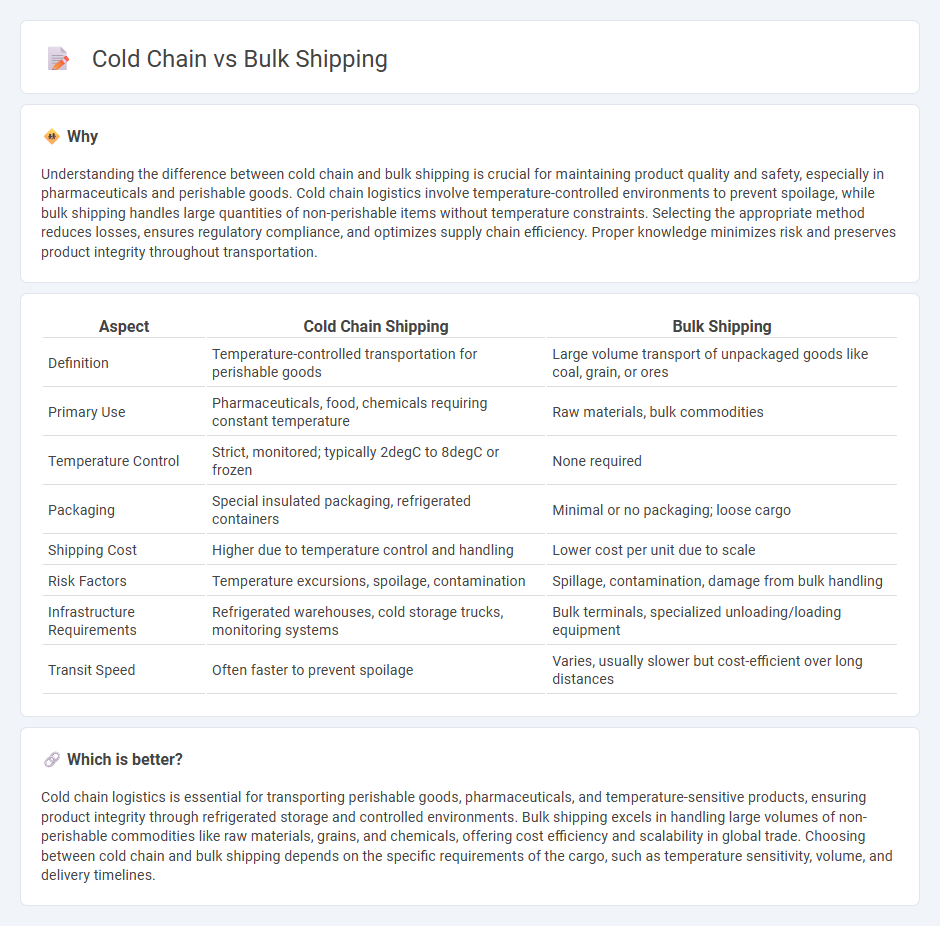
Cold chain logistics ensures temperature-sensitive products like pharmaceuticals and perishable food items maintain quality through controlled environments during transit, while bulk shipping focuses on transporting large quantities of homogeneous goods such as grains, coal, or chemicals efficiently and cost-effectively. Both methods require specialized equipment and handling procedures to optimize delivery and minimize spoilage or damage. Explore deeper insights into cold chain and bulk shipping strategies to enhance supply chain effectiveness.
Why it is important
Understanding the difference between cold chain and bulk shipping is crucial for maintaining product quality and safety, especially in pharmaceuticals and perishable goods. Cold chain logistics involve temperature-controlled environments to prevent spoilage, while bulk shipping handles large quantities of non-perishable items without temperature constraints. Selecting the appropriate method reduces losses, ensures regulatory compliance, and optimizes supply chain efficiency. Proper knowledge minimizes risk and preserves product integrity throughout transportation.
Comparison Table
| Aspect | Cold Chain Shipping | Bulk Shipping |
|---|---|---|
| Definition | Temperature-controlled transportation for perishable goods | Large volume transport of unpackaged goods like coal, grain, or ores |
| Primary Use | Pharmaceuticals, food, chemicals requiring constant temperature | Raw materials, bulk commodities |
| Temperature Control | Strict, monitored; typically 2degC to 8degC or frozen | None required |
| Packaging | Special insulated packaging, refrigerated containers | Minimal or no packaging; loose cargo |
| Shipping Cost | Higher due to temperature control and handling | Lower cost per unit due to scale |
| Risk Factors | Temperature excursions, spoilage, contamination | Spillage, contamination, damage from bulk handling |
| Infrastructure Requirements | Refrigerated warehouses, cold storage trucks, monitoring systems | Bulk terminals, specialized unloading/loading equipment |
| Transit Speed | Often faster to prevent spoilage | Varies, usually slower but cost-efficient over long distances |
Which is better?
Cold chain logistics is essential for transporting perishable goods, pharmaceuticals, and temperature-sensitive products, ensuring product integrity through refrigerated storage and controlled environments. Bulk shipping excels in handling large volumes of non-perishable commodities like raw materials, grains, and chemicals, offering cost efficiency and scalability in global trade. Choosing between cold chain and bulk shipping depends on the specific requirements of the cargo, such as temperature sensitivity, volume, and delivery timelines.
Connection
Cold chain logistics ensures temperature-sensitive goods remain within specific thermal conditions throughout the supply chain, while bulk shipping facilitates the large-scale transport of these perishable products. Integrating cold chain technology with bulk shipping methods optimizes the preservation of pharmaceuticals, seafood, and fresh produce during long-haul transport. Advanced refrigerated containers and monitoring systems enable efficient temperature control, reducing spoilage and maintaining product quality across global distribution networks.
Key Terms
**Bulk Shipping:**
Bulk shipping involves transporting large quantities of unpackaged goods, primarily raw materials or commodities, using specialized vessels like bulk carriers. It is highly cost-effective for items such as coal, grain, and ores, but lacks temperature control, making it unsuitable for perishable or temperature-sensitive products. Explore more to understand the benefits and limitations of bulk shipping in various industries.
Dry Bulk Cargo
Dry bulk cargo shipping involves transporting large quantities of unpackaged goods such as coal, grain, and minerals that do not require temperature control, unlike cold chain logistics which focus on perishable items needing refrigerated environments. Bulk shipping optimizes cost-efficiency and volume handling through cargo-specific vessels like bulk carriers, facilitating global trade in commodities with minimal packaging. Explore detailed comparisons of operational strategies and cost implications in dry bulk versus cold chain logistics to enhance your supply chain management knowledge.
Tanker Vessels
Tanker vessels used in bulk shipping are engineered for transporting large volumes of liquids such as crude oil, chemicals, and liquefied gases, maintaining product integrity without refrigeration. Cold chain shipping, in contrast, requires specialized refrigerated tanker vessels equipped with temperature control systems to preserve perishable goods, pharmaceuticals, or chemicals sensitive to temperature fluctuations. Explore detailed specifications and operational insights of tanker vessels in both bulk shipping and cold chain logistics to enhance supply chain efficiency.
Source and External Links
Bulk Shipping: Mass Shipping & Shipping Large Quantities - Bulk shipping involves transporting large quantities of goods without packaging, loaded into shipping containers and transported by sea, typically suitable for B2B and wholesale, involving storage at ports, loading onto vessels, and unloading at destination ports for final delivery.
Bulk Cargo 101: What You Need to Know About Shipping Bulk Cargo - Bulk cargo shipping requires specialized equipment and careful planning for loading, transport, and unloading of dry or liquid cargo using bulk carriers, railroad cars, and tanker trucks, with emphasis on safety and regulatory compliance.
All You Need to Know About Different Bulk Shipping Options - Bulk shipping options include bulk vessels for dry and liquid cargo, ISO tank containers for liquids, and flexitanks for cost-effective transport of non-hazardous liquids, each designed for efficient and safe bulk commodity transport.
 dowidth.com
dowidth.com